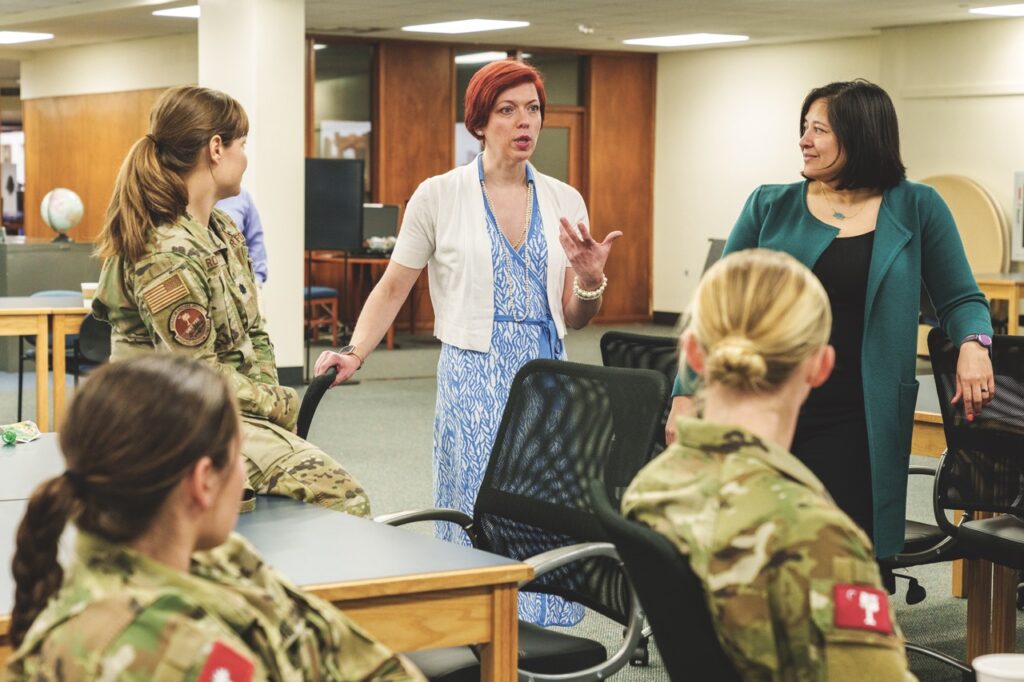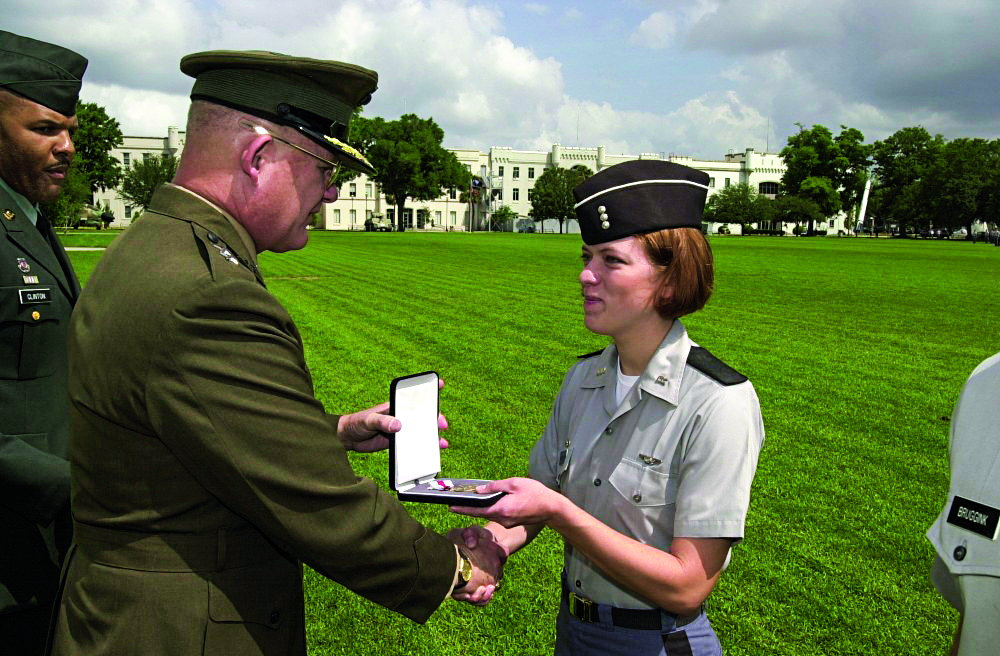When Melanie De Santiago Kinney arrived in South Carolina on a sweltering August Friday in 1997 to report to The Citadel, the spunky 5’5 18-year-old looked anything but the picture of a nervous, first-time college student. She didn’t arrive in an overstuffed station wagon, and there were no anxious parents hovering around her. Instead, Kinney, who was traveling alone, confidently stepped out onto an Amtrack platform in North Charleston, loaded down with everything needed to outfit a half-press. Bed linens; check. Twelve white cotton crew-neck t-shirts; check. Twelve pairs of white cotton underwear; check. Ten pairs of black crew-length socks; check. And so it went with all of the other specific quantities of the regulation items; check, check, check. Greeting her was a 1975 alumnus, Scott MacLeod, who took her to the Riverview Holiday Inn, just across the Ashley River from The Citadel, where she would stay the night. Kinney was one of 560 cadet recruits who would report on August 23 and one of 19 women in her class. Their arrival occurred early in the assimilation of women into the Corps of Cadets, and Kinney’s class was just the second class of women cadets who would go on to graduate. There was much work to be done, and Kinney rose to the challenge, taking on leadership roles and shattering glass ceilings. The Citadel provoked her, fostered her independent spirit and prepared her for an intriguing career in the world of intelligence.

Most people are surprised when Kinney tells them that she is a naturalized U.S. citizen. She was born in Ziegenhain, Germany, in 1979. When she was 5, her mother married an enlisted U.S. Army soldier named De Santiago. While the marriage was short lived, it was significant for Kinney, who became Melanie De Santiago until she changed her name as an adult and chose to go by Melanie Kinney. The marriage also meant that she began her formal education attending American Department of Defense schools, which helped to prepare her for the environment she later found at The Citadel.
As a child growing up in Germany in the age before social media, Kinney was curious and enjoyed learning. The exposure to two cultures broadened her perspective and fed her thirst for knowledge. While America gave her an education, Germany gave her a grandfather she admired. Albert Pfuhl, a local politician, took her to political meetings and debates, an unusual pastime for a child, but something Kinney enjoyed.
When she was 14, Kinney, who had spent 18 months in Ft. Hood, Texas, as a child, permanently moved to the United States. In 1997, she graduated from high school with honors in Denton, Texas. An Air Force ROTC student with an independent streak nurtured by solo transatlantic travel, Kinney’s plan was to attend The Citadel for a year, which she felt would make her a more competitive candidate to transfer to the Air Force Academy. So without ever having visited the college, or even South Carolina, Kinney committed to The Citadel, becoming one of the first women to attend the once all-male military college. “I can’t necessarily speak for the women now,” said Kinney, “but I think for us in the early years, there had to have been a tinge of rebellion to come here because you were challenging the status quo.”
Within a year of matriculating, Kinney’s plans to transfer to the Air Force Academy were all but forgotten, and instead she majored in German at The Citadel and received a three-year Air Force scholarship as a sophomore, making her the first female cadet to pursue an active-duty commission.

Of the 19 women who matriculated in 1997, eight graduated. “As a woman and especially in those early classes, for you to know that you belong here, you had to stake your claim,” she said. “No one was going to stake that for you, and I know definitely while all eight of us don’t necessarily keep in contact on a daily basis, or maybe even at all, we all have that ability to own the space we walk into. And it’s something that we had to learn as cadets because if we didn’t, we could easily have been outnumbered and pushed aside.”
Kinney was never pushed aside—she was busy making an impression. As a sophomore, she served as Romeo Company clerk in the fall semester and regimental clerk in the spring. She was the first woman to hold both of these positions. As a junior, she became the first woman to hold the rank of Fourth Battalion sergeant major. In 2000, she and classmate Dena Abrash became the first female company commanders.
“If I didn’t speak up, I wouldn’t have been able to advocate for my battalion or advocate for my company or advocate for myself or even for the other women. And that’s something you learn. I found my voice. You really find your voice very early at The Citadel,” said Kinney. “You learn to hold your ground because, if not, you just fade into the sea of gray with everybody else.”
“You really find your voice very early at The Citadel.”
Along with her voice, Kinney found that she had opportunities for personal growth and to make a difference. Very early on, she became comfortable briefing the president or the commandant or being part of a committee making decisions that are still binding today, like establishing policies and procedures for uniforms, conduct and inspections for women.
As Kinney was completing her education, she was also making plans for her future. She became interested in the Air Force Office of Special Investigations, and in the summer of her junior year, she went through a four-week shadow program at Mountain Home Air Force Base outside of Boise, Idaho. Not surprisingly, Kinney later learned that she had been selected, and after graduation, she set out for her first assignment in Misawa, Japan, for two years, followed by an assignment at the headquarters of the Air Force Office of Special Investigations at Andrews Air Force Base in Maryland.
Kinney has led a vast and impressive—and mostly classified—career in intelligence since her graduation more than 20 years ago. In addition to working active duty in the Air Force for four years, she served as an operations officer and a staff officer with the U.S. Army in the United States and abroad.
Kinney also served as an intelligence oversight official with the Office of the Assistant to the Secretary of Defense for Intelligence Oversight. She was a special agent with the FBI assigned to the New York field office for three years, and she served as an operations officer with the Defense Intelligence Agency in the United States and abroad. Kinney completed a total of four deployments as a civilian to Iraq, Afghanistan and Kosovo. In 2015, after a deployment with the Special Mission Unit, she was named the Department of Defense HUMINT (Human Intelligence) Collector of the Year. Kinney currently works for the Air Force.
While Citadel graduates have played a vital role in the intelligence field for decades, the intelligence and security studies major on campus was not established until 2017. Melissa Graves, Ph.D., who came to The Citadel in 2016 from the University of Mississippi, where she helped create its program, was instrumental in starting The Citadel’s program and now serves as department head.
“Intelligence offers policy makers a decision advantage when they’re making the political decisions that affect the country and the world, so intelligence is in service to policymakers,” said Graves. “Whether it’s the president or the secretary of defense or the secretary of state or somebody very high up in the military, or somebody who’s going to make these very critical decisions, we want them to have the best information that they can possibly have so that they make the best decisions.”
Since its inception on campus, intelligence and security studies has grown to become the largest major on campus. The program offers four concentrations for students interested in specializing beyond the general program—counterterrorism, business intelligence, Chinese area studies, and The Citadel’s most popular concentration, military intelligence. There is also a counterterrorism minor.
“One of the things that makes me so proud to work at The Citadel is hearing stories from people like Melanie and knowing that The Citadel really is producing so many people who are making a difference in the world and making it a better, safer place,” said Graves. “The fact that we were doing that before the intelligence major was set up, I think is noteworthy. And now we’ve formalized that with the major, and we hear from alumni quite frequently who went through The Citadel before our major existed but have found their way into the intelligence community anyway.”
Outside of her work with the Air Force, Kinney serves as a mentor to young women at Girl Security, a nonprofit organization that seeks to broaden the diversity of the national security work force. She and classmate Eileen Guerra Quinn are starting a networking program called The Citadel Women’s Mentoring Group to build relationships between alumnae and female cadets to create a robust professional network of Citadel women. Although Kinney did not fit the picture of the classic American student going off to college all those years ago, the picture she fits today is that of the American dream. In the land of promise, Kinney, like scores and scores of other Citadel alumni, is working behind the scenes to keep her adopted country safe, and in her spare time, she is helping to develop the next generation of women who will follow in her footsteps.
